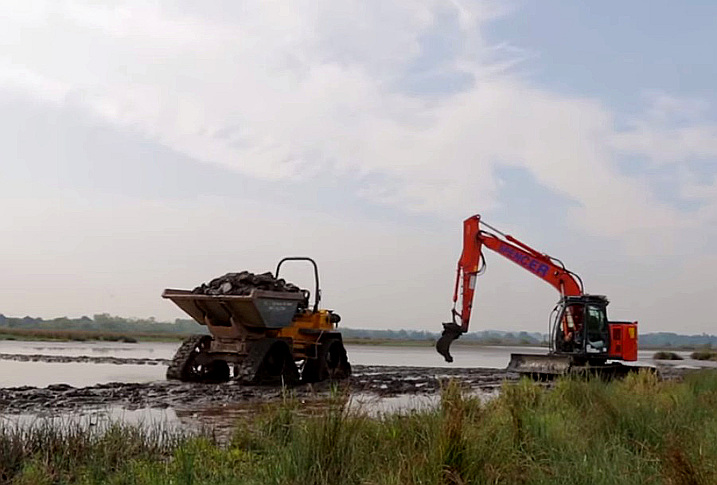Dredging up Trouble: Government urged to resist playing politics over winter flood measures
The Government has been warned that potentially environmentally damaging dredging must not be prioritised over other proven flood-prevention measures in this year’s Autumn Statement on 3 December 2014.
In a new report Dredging up Trouble, Blueprint for Water – a coalition of ten organisations including WWT, representing over two million members [note 1] – is highlighting the importance of other options being properly considered.
The report identifies 10 priority areas which would inevitably lose out if new funding is ring-fenced for dredging alone. These include protecting life and public health, natural flood management options and sustainable drainage systems [note 2].
Martin Spray, Chief Executive from the Wildfowl & Wetlands Trust concluded:
“It’s understandable that politicians want to be seen to do ‘something’, but it’s vital that this does not stop us looking at the evidence and doing the ‘right thing’. Dredging is only one small part of the solution and other options are often more cost-effective in delivering the best outcome for people and wildlife. If the Government wants to properly address flooding, it must consider all the areas we set out in this report”.

The report’s authors emphasise that failure to consider all options will be in breach of Defra’s own rules which ensure that the Environment Agency targets its limited budget to areas where the benefit to communities is greatest. Recent studies have shown that dredging can, in some cases, make downstream flooding worse by moving water too quickly down river catchments.
Alastair Moseley, Honorary Vice President, The Chartered Institution of Water and Environmental Management (CIWEM), said:
"Last winter’s floods were not exceptional and will happen again. We must be prepared for these events and ensure that funding and appropriate flood risk management approaches are put in place. The government must understand that this extends way beyond dredging and needs to encompass resilience, sustainable land use and other measures which are tried, tested and supported by evidence."
Janina Gray, Chair of the Blueprint for Water and Head of Science for the Salmon & Trout Association said:
“Within the Blueprint for Water Coalition we are concerned that, in its eagerness to be seen to be ‘doing something’, the Government will increase investment in dredging. This could exacerbate, rather than reduce, flood risk in areas and cause environmental damage. It would also reduce the likelihood of other more effective solutions being taken forward”.
Mark Lloyd, Chief Executive of the Angling Trust stated:
“The Government has been trying to find ways to stop farmers’ fields flooding, but ignoring the fact that bad management of farmers’ fields is causing flooding of people’s homes. Instead of wasting money on dredging, which is largely pointless, the Government should use the existing £2 billion subsidies from taxpayers to drive real change in farming practices to improve water management throughout river catchments.”
Environmental and wildlife organisations are concerned that a diktat to the Environment Agency by the former Environment Secretary Owen Paterson [note 3] could trigger a return to policies of the 1960s and 1970s, and turn many rivers into straightened flood channels in order to be seen to be ‘doing something’.
The RSPB backed Floods and Dredging – A Reality Check: a CIWEM report illustrating the folly of relying on dredging alone to reduce flood risk. Rob Cunningham, head of water policy at the RSPB, said:
“It’s vital Government takes an evidence-led approach to reducing flood impacts through a range of measures working with natural processes to complement traditional defences by: slowing flows; and increasing infiltration and flood storage throughout catchments. That doesn’t just mean more money – it also means securing better value from the £2billion spent supporting farmers by requiring tougher action to protect soils and targeting additional payments where they deliver greatest benefit.”
Paul Wilkinson, Head of Living Landscape, The Wildlife Trusts said:
“The tax payer expects the Government to invest in cost effective and long term solutions to flooding which provide good value for money. In the long term, investing in natural fixes will be the wisest investment of all. It is time for the Government to recognise that large scale restoration and creation of networks of healthy habitats which store and retain water will reduce our vulnerability and increase our resilience to extreme weather events. Working with nature, rather than against it, is the key.”
The coalition has submitted a formal response to the Treasury consultation on the Autumn Statement, which closed on Friday 17 October, 2014.
Notes:
1. The Dredging up Trouble report is endorsed by the Chartered Institution of Water and Environmental Managers (CIWEM); The Wildlife Trusts; Angling Trust; Wildfowl and Wetlands Trust; Institute of Fisheries Management; Friends of the Earth; Buglife; RSPB; Salmon & Trout Association; Amphibian and Reptile Conservation.
2 The 10 principles outlined in the Dredging up Trouble report are:
Protecting life and public health
Defences that protect hospitals, care homes and bungalows – where people can’t escape upstairs – should be top of the list.
Natural Flood Management
More and more towns and villages are being protected by flood schemes that integrate habitat restoration with traditional flood walls: wetlands that store floodwaters, woodlands that slow flash floods and river restoration to hold more water in meanders and natural floodplains.
New Flood Defences
With 4 million homes at risk of flooding there is inevitably a long list of worthwhile new flood defences waiting to be built once enough funding becomes available.
Flood Recovery
It can take months or years to get back into your house after a flood, and the long and complicated recovery process can be as upsetting as the original flood. Government could offer an important helping hand to people as they put their home or business back together.
Sustainable Drainage
The evidence for the cost-effectiveness, biodiversity provision and water treatment capabilities have been demonstrated repeatedly and it is therefore time for SuDS to be taken up on a much larger scale.
Coping with Climate Change
Climate change is already delivering more extreme weather with more flood events of greater severity. Investment is badly needed in adaptive schemes to provide future resilience for flood prone communities.
Defending Transport & Utilities
One-fifth of our rail network is at risk of flooding, a quarter of our gas infrastructure and many of our largest ports. It is important that money is available to safeguard our national infrastructure.
Enough staff for emergencies
4,500 Environment Agency staff were involved in last winter’s emergency flood work, including 800 who don’t usually work on flood management. With over a thousand jobs are expected to be lost in the Environment Agency alone it is doubtful whether the sufficient resources will be available to cover future flood events.
Enforcing the rules
Farmers receive £2 billion a year in subsidy on the condition that minimum legal safeguards are met including safeguarding soils so they don’t wash off fields and clog our rivers. Environment Agency surveys have found thousands of soil erosion issues yet only a tiny percentage result in enforcement action.
A duty of care to communities
We believe there should be much greater clarity about the role of local and national government in planning and facilitating adaptation, with funding dedicated to help people, communities and businesses who can’t be fully protected
3 In June 2014, the Environment Agency informed stakeholders of a new instruction from the Environment Secretary appearing to prioritise dredging over other flood-risk management options:
“I want to let you know that the Secretary of State has requested that we provide Defra with a prioritised list of locations where dredging would improve conveyance and reduce flood risk. This follows the ongoing response to the winter floods and the recent response to the EFRA Committee.”

